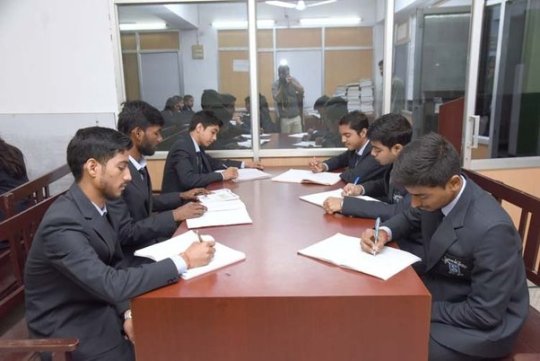#ENSURE IAS coaching tips
Text
Negative Habits to Avoid for UPSC Preparation
Imagine preparing for the UPSC exam is like setting off on a thrilling adventure. But just like any adventure, there are challenges to overcome. It takes a lot of hard work, sticking to your goals, and having a good plan. But, sometimes, even if you're really trying your best, you might find yourself doing things that could make it harder for you to succeed. In this guide, we'll explore common negative habits faced by UPSC aspirants and provide straightforward solutions to overcome them. By implementing these simple strategies, aspirants can navigate through challenges effectively and achieve success in their UPSC journey.
Procrastination - Putting Off Tasks

Procrastination is when we delay tasks or waste time on unimportant things. Many UPSC aspirants struggle with procrastination, which can lead to missed study sessions and last-minute pressure.
To overcome procrastination, break your study tasks into smaller, manageable parts. To create a sense of urgency, establish particular deadlines for every task. By taking small steps consistently, you can avoid procrastination and stay on track with your study schedule.
“You may delay, but time will not.”
― Benjamin Franklin
There are always distractions, if you allow them! Successful people remain optimistic and concentrated on their goals regardless of their surroundings. They stay focused. They avoid getting distracted, which is common in today's digital world. Social media, notifications, and other distractions can easily divert our attention away from studying.
To avoid distractions, create a dedicated study space that is free from potential distractions. Turn off notifications on your phone and use productivity tools to block distracting websites. Set specific times for studying and avoid multitasking. By minimizing distractions, you can improve focus and productivity during your study sessions.
Distractions - Losing Focus

“Work is hard. Distractions are plentiful. And time is short.”
― Adam Hochschild
Lack of Consistency

Consistency is really important for doing well in UPSC preparation. It’s key to success. However, many aspirants struggle to maintain a consistent study routine.
To overcome this, establish a daily study schedule and stick to it religiously. Make sure you stick to your study schedule and give it more importance than other things. Set realistic goals for each study session and keep checking how well you're doing. By making studying a habit and sticking to a consistent routine, you can maximize your productivity and progress in your UPSC preparation.
“Success isn't always about greatness. It's about consistency.
Consistent hard work leads to success. Greatness will come.”
― Dwayne Johnson
Neglecting Health and Adequate Sleep

UPSC preparation can be mentally and physically demanding, and many aspirants neglect their health in pursuit of their goals. However, neglecting your health can have negative consequences on your ability to study effectively. Sleep is essential for cognitive function, memory retention, and overall well-being. However, many aspirants neglect their sleep in favor of studying late into the night. This can lead to sleep deprivation, which can impair your ability to focus, concentrate, and retain information.
To prioritize your health, make sure to get an adequate amount of sleep each night. Aim for at least 7-8 hours of sleep to ensure that your mind and body are well-rested. In addition, make time for regular exercise and physical activity to reduce stress and improve overall well-being. Finally, don't forget to eat a balanced diet and stay hydrated to fuel your body and brain for studying.
Relying on One Study Method

Every aspirant has their own preferred study method, whether it's reading, taking notes, or practicing past papers. However, relying solely on one study method can limit your learning and comprehension.
To overcome this, try diversifying your study methods to engage different parts of your brain. For example, if you're used to reading, try incorporating more visual aids or discussing concepts with peers. Try out various methods of studying until you discover which one suits you the most. By diversifying your study methods, you can improve your understanding and retention of the material.
Negative self-talk can be dangerous to your confidence and motivation. Many aspirants struggle with self-doubt and fear of failure, which can hold them back from reaching their full potential.
To overcome negative self-talk, practice self-compassion and positive affirmations. Instead of focusing on your shortcomings, celebrate your achievements and strengths. Be around friends and family who support you and have faith in your skills. By cultivating a positive mindset and practicing self-love, you can overcome self-doubt and achieve success in your UPSC journey.
Negative Self-Talk - Self-Doubt

"One important key to success is self-confidence.
An important key to self-confidence is preparation."
― Arthur Ashe
Trying to Read Everything

UPSC aspirants are often overwhelmed by the sheer volume of reading material available. Many aspirants feel pressured to read every book and resource on a given topic, leading to stress and burnout.
To overcome this, focus on quality over quantity when it comes to reading. Prioritize essential books and resources that cover the core concepts and topics of the UPSC syllabus. Take notes as you read to help reinforce your understanding and retention of the material. Remember, it's better to thoroughly understand a few key concepts than to skim/go through numerous resources without grasping the core concepts.
Disorganization can hinder your ability to study effectively and efficiently. Many aspirants struggle to keep track of study materials, deadlines, and important dates.
To overcome this, create a study schedule and organize your study materials in a systematic manner. Use folders, binders, or digital tools to keep your study materials organized and easily accessible. Break down your study schedule into smaller, manageable tasks and set deadlines for each task. By staying organized, you can reduce stress and improve productivity in your UPSC preparation.
Lack of Organization

“For every minute spent organizing, an hour is earned.”
― Benjamin Franklin
Misplaced Study Groups

Study groups can be a valuable resource for UPSC aspirants, providing support, motivation, and shared knowledge. However, not all study groups are created equal, and some aspirants may find themselves in study groups that are not conducive to effective studying.
To overcome this, choose study partners wisely and find individuals who are serious and committed to their UPSC goals. Look for study groups or forums where you can engage with like-minded aspirants who share your dedication and enthusiasm for UPSC preparation. By surrounding yourself with supportive and motivated study partners, you can enhance your learning and stay on track with your UPSC goals.
Overcoming negative habits is essential for UPSC aspirants to succeed in their journey. By implementing simple strategies such as breaking tasks into smaller parts, minimizing distractions, maintaining consistency, prioritizing health, diversifying learning methods, fostering a positive mindset, finding a balance between work and study, focusing on quality reading, staying organized, choosing study partners wisely, using the internet judiciously, and prioritizing sleep, aspirants can navigate through challenges effectively and achieve success in their UPSC preparation. Remember, success in the UPSC examination requires dedication, perseverance, and a willingness to overcome obstacles. Keep pushing forward, stay focused on your goals, and believe in yourself—victory is within reach!
#upsc#education#upsc2024#upscpreparation#upscstudymaterial#quotes for upsc aspirants#quotes for students motivation#Misplaced Study Groups in UPSC Preparation#Lack of Organization in UPSC Preparation#Trying to Read Everything in UPSC Preparation#Negative Self-Talk - Self-Doubt#Relying on One Study Method#Neglecting Health and Adequate Sleep in upsc preparation#Lack of Consistency in upsc preparation#Distractions in upsc preparation#procrastination in upsc preparation#Procrastination#upsc syllabus ignorance#upsc exam strategy mistakes#ENSURE IAS coaching tips#upsc self-study bad habits#upsc time management mistakes#ENSURE IAS academy tips#upsc coaching center habits to avoid#upsc study routine mistakes#UPSC#bad habits for upsc exam#common mistakes in upsc preparation#ENSURE IAS preparation tips#negative habits for upsc aspirants
3 notes
·
View notes
Text
How to Prepare for the IAS Exam Using Smart Study Techniques

Preparing for the IAS exam is a rigorous journey that requires a strategic approach, effective study techniques, and a strong commitment to excellence. As you embark on this challenging path, it’s essential to adopt smart study techniques that enhance your learning, retention, and application of knowledge. This blog will guide you through various methods to optimize your IAS preparation, while also highlighting the benefits of enrolling in a tnpsc coaching centre in coimbatore for structured support.
Understanding the IAS Exam Structure
Before diving into study techniques, it’s crucial to understand the IAS exam structure. The examination comprises three stages:
Preliminary Examination: This consists of two objective-type papers — General Studies I and General Studies II (CSAT).
Mains Examination: This includes nine papers, out of which two are qualifying. The remaining papers cover a variety of subjects including General Studies, an optional subject, and an essay.
Interview: The final stage assesses your personality, communication skills, and overall suitability for civil services.
With this understanding, you can tailor your study techniques to each stage of the examination.
Smart Study Techniques for IAS Preparation
1. Create a Structured Study Plan
A well-structured study plan is the foundation of effective preparation. Here’s how to create one:
Assess Your Current Knowledge: Start by evaluating your strengths and weaknesses in various subjects. This will help you allocate your time effectively.
Set Realistic Goals: Break down your preparation into manageable chunks. Set daily, weekly, and monthly goals that align with the IAS syllabus.
Balance Subjects: Ensure that you cover all subjects, including current affairs, history, geography, and optional subjects. A balanced approach prevents burnout and keeps your mind fresh.
2. Utilize the Pomodoro Technique
The Pomodoro Technique is an effective time management method that can enhance your concentration. Here’s how it works:
Work in Intervals: Study for 25 minutes, then take a 5-minute break. This helps maintain focus and reduces mental fatigue.
Longer Breaks: After four cycles, take a longer break of 15-30 minutes. Use this time to refresh your mind through physical activity or relaxation techniques.
3. Make Effective Notes
Note-making is crucial for reinforcing your learning. Follow these guidelines to make your notes effective:
Use Bullet Points: Organize information using bullet points, headings, and subheadings. This structure makes it easier to review later.
Highlight Key Points: Use different colors or highlighters to emphasize important concepts, dates, and definitions.
Summarize: After each study session, write a brief summary of what you learned. This aids in retention and makes revision easier.
4. Incorporate Visual Learning
Visual aids can significantly enhance your understanding and retention of complex topics. Consider the following:
Mind Maps: Create mind maps to visually organize information. This technique helps in linking concepts and enhancing memory recall.
Charts and Diagrams: Use charts and diagrams to represent data, especially in subjects like geography and economics. Visual representations can simplify complicated information.
5. Regular Revision
Regular revision is essential for long-term retention of knowledge. Here are some tips:
Schedule Revision Sessions: Allocate specific days for revision in your study plan. Regularly revisiting topics reinforces your learning.
Practice Active Recall: Test yourself on the material without looking at your notes. This method strengthens memory and identifies areas that need further attention.
6. Stay Updated with Current Affairs
Current affairs play a vital role in the IAS examination. Here’s how to stay informed:
Daily News Reading: Dedicate time each day to read newspapers and magazines. Focus on political, economic, and social issues relevant to India and the world.
Monthly Current Affairs Compilations: Use monthly compilations or newsletters to keep track of significant events and updates. This will make revision easier as the exam approaches.
7. Practice Mock Tests
Mock tests are invaluable for assessing your preparedness. Here’s how to make the most of them:
Simulate Exam Conditions: Take mock tests in a quiet environment and time yourself. This helps you get accustomed to the exam format and time constraints.
Analyze Your Performance: After each mock test, review your answers. Identify weaknesses and adjust your study plan accordingly.
8. Join a Coaching Institute
Enrolling in a tnpsc coaching centre in coimbatore can provide structured guidance and support throughout your IAS preparation. Here are some benefits of joining a coaching center:
Expert Guidance: Coaching centers employ experienced faculty who can clarify doubts and provide insights into complex topics.
Peer Learning: Being surrounded by fellow aspirants fosters a competitive yet collaborative environment. You can share knowledge, resources, and study techniques.
Structured Curriculum: A well-defined syllabus and study plan from a coaching center can streamline your preparation, ensuring you cover all essential topics.
9. Focus on Mental and Physical Health
Maintaining your mental and physical health is crucial during your IAS preparation. Consider these strategies:
Regular Exercise: Engage in physical activities like jogging, yoga, or gym workouts. Exercise enhances focus and reduces stress.
Mindfulness Practices: Incorporate mindfulness techniques such as meditation to manage anxiety and improve concentration.
Healthy Diet: Fuel your body with nutritious foods to enhance cognitive function and maintain energy levels.
10. Stay Motivated
Maintaining motivation is key to enduring the long preparation process. Here are some tips to stay inspired:
Visualize Success: Regularly visualize yourself achieving your goals. This positive affirmation can boost your confidence and drive.
Set Milestones: Celebrate small achievements along the way. Recognizing progress keeps you motivated and focused.
Connect with Alumni: Reach out to previous IAS successful candidates for inspiration and guidance. Their experiences can provide valuable insights and encouragement.
Conclusion
Preparing for the IAS exam is a demanding yet rewarding journey. By employing smart study techniques and remaining committed to your goals, you can navigate this challenging process effectively. Remember to utilize resources available at a tnpsc coaching centre in coimbatore, as structured guidance can enhance your learning experience.
As you embark on your IAS preparation, keep these strategies in mind. Stay organized, practice regularly, and prioritize your mental and physical well-being. With determination and the right approach, you can pave your way to success in the IAS examination.
Hashtags
#IASPreparation #StudyTechniques #tnpsccoachingcentre #UPSC #CivilServices #CurrentAffairs #MockTests #HealthInStudy #Motivation #Coimbatore
0 notes
Text
Can I Crack UPSC with Free Online Resources?

The short answer is: yes, you can. While UPSC is a highly competitive exam, free online resources can play a significant role in your preparation. However, it's important to understand the limitations and complement your online learning with other strategies.
Also Read: UPSC Online Coaching
Why Free Online Resources Can Be Helpful
Accessibility: Free resources are readily available, making them accessible to a wide range of aspirants, regardless of their financial constraints.
Variety: The internet offers a vast array of resources, including study materials, practice tests, video lectures, and discussion forums.
Flexibility: Online learning allows you to study at your own pace and convenience.
Also Read: IAS Online Coaching
Key Free Online Resources to Consider
Government Websites: Websites like UPSC's official website, NCERT, and PIB provide authentic and reliable study material.
Online Platforms: Platforms like Khan Academy, Coursera, and edX offer free courses and lectures on various subjects relevant to the UPSC syllabus.
YouTube Channels: Many educators and UPSC toppers have created YouTube channels with valuable content, including subject-wise lectures, strategy discussions, and mock tests.
Online Forums: Platforms like Quora, Reddit, and UPSC-specific forums can provide insights, tips, and motivation from fellow aspirants.
Tips for Effective Use of Free Online Resources
Curate Your Resources: Carefully select the resources that align with your learning style and the UPSC syllabus.
Create a Study Plan: Develop a structured study plan to ensure consistent progress and avoid information overload.
Practice Regularly: Solve practice tests and IAS mock papers to assess your understanding and identify areas for improvement.
Join Online Communities: Engage with other aspirants on online forums to discuss doubts, share experiences, and stay motivated.
Supplement with Offline Resources: Consider using offline resources like textbooks, newspapers, and magazines to enhance your understanding.
Limitations of Free Online Resources
Quality Variation: The quality of free resources can vary, so it's important to critically evaluate their content.
Lack of Personalized Guidance: Free resources may not provide the same level of personalized guidance as paid coaching.
Time Management: Managing multiple free resources can be challenging if not planned effectively.
In conclusion, while free online resources can be a valuable asset in your UPSC interview preparation, they should be used in conjunction with other strategies. A well-structured study plan, consistent practice, and effective time management are essential for success. By leveraging the power of free online resources, you can significantly enhance your chances of cracking the UPSC exam.
0 notes
Text
Best Tips for IAS Preparation
Here are some of the best tips for IAS preparation that can help you effectively navigate your journey toward success:

1. Understand the UPSC Syllabus
The syllabus is your guide to preparation. It will help you know what to study and what to avoid. Make sure you go through the syllabus thoroughly.
2. Start with NCERTs
NCERT books from 6th to 12th grade are fundamental. They provide basic knowledge in subjects like History, Geography, Polity, and Economics. Reading these will strengthen your foundation.
3. Make a Timetable
Create a realistic and disciplined timetable. Allocate fixed hours for each subject and make sure you stick to it. Balance between covering new topics and revising old ones.
4. Read Newspapers Regularly
Current affairs are crucial for both Prelims and Mains. Reading The Hindu or Indian Express daily will help you stay updated on important events. Supplement this with current affairs magazines.
5. Practice Answer Writing
Writing structured answers is key to scoring well in the Mains exam. Practice answer writing regularly to improve your presentation and clarity of thought. Joining a test series for Mains can be helpful.
6. Attempt Mock Tests
Regular UPSC mock tests help you manage time and understand the UPSC exam pattern. They are essential for Prelims as well as Mains preparation. Evaluate your performance and work on weak areas.
7. Stay Focused on Revision
Consistent revision is necessary to retain information. Revise your notes and important topics frequently to avoid forgetting key concepts.
8. Focus on Optional Subject
Choose an optional subject wisely. It should be based on your interest, availability of study material, and scoring trends. Make sure to prepare your UPSC optional subject as thoroughly as General Studies.
9. Limit Your Study Resources
Avoid gathering too many books and materials. Stick to a few good sources and revise them multiple times. Quality matters more than quantity in IAS preparation.
10. Take Care of Your Health
Maintaining physical and mental health is crucial. Ensure you get enough sleep, exercise regularly, and take breaks during long study hours. Meditation and mindfulness can help reduce stress.
11. Join a Coaching (If Necessary)
If self-study is not enough or you need extra guidance, joining a coaching institute like Vajirao and Reddy IAS can be beneficial. They provide structured courses and expert guidance.
12. Stay Motivated and Consistent
IAS preparation can be a long and tough journey. Stay motivated and persistent. Take each day as a new opportunity to get closer to your goal.
By following these tips and maintaining discipline, consistency, and self-belief, you can improve your chances of success in the IAS exam.
0 notes
Text

How do I predict which questions will be asked next in the UPSC exam?
Your score in the second part of the IAS test, (UPSC Civil Services Mains exam) are going to have an important impact on your final score. This Civil Services Mains Exam is an exam that is subjective, consisting of nine paper and a writing time of 27 hours. The two qualifying exams include the Mandatory Indian Language test (Paper A) as well as The English exam (Paper B). There are three hours in which you must compose two essays for the essay (Paper I). Each topic will be included in a list available for candidates to select out of (Sections A & B). Each essay should be between 1000 to 1100 words. Then, moving to the GS the GS comprises 4 General Studies (GS) papers (Paper II through Paper V) Each paper is awarded up to 250 marks.
What are the most important areas you need to cover?
It is advisable to practice practicing the Previous Years Papers- This helps you understand how the question is.
Follow the syllabus- It aids you in understanding the subjects that are asked frequently and making notes which are vital to preparation. In addition, keeping the syllabus can help in keeping track of your development
How do you anticipate questions for the upcoming UPSC exam?
Although UPSC will attempt to include questions from a variety of fields to ensure the toughness of the examinations, current events can be utilized to anticipate the type of questions. Take a look at the following tips which you can use in your practice of being able to identify the questions that are most likely to be asked. Here at Vajirao & Reddy IAS Institute We teach our students develop this ability and offer our insight on the most important subjects to be covered in the test is. This is undoubtedly aided us to provide the most effective UPSC coaching in Delhi.
Recurring topics in the news- News stories that have recurring topics If a subject is repeatedly mentioned, it stands an increased chance of being requested on the IAS test.
Editorials: The editorials that appear in the Hindu or Indian Express are a treasure for analysis of the specific topic or incident. The majority of the time, UPSC selects the subject from these editorials and then asks questions based upon it. Therefore, if you regularly read these editorials, you are more likely of being asked an identical Mains question. Be sure to look at this editorial in a neutral point of view since the author may be motivated by a political agenda however, as an UPSC aspirant, you're expected to remain an impartial perspective.
Predicting the static topics– Topics that are static are usually discussed at random. However, when an incident that is related to a topic that is static has occurred, the probability of asking questions about the topic are also increased.
I'd like to remind UPSC candidates that writing is an art as is every artist who has learned it, you shouldn't let yourself down and work hard to achieve it. However difficult it gets, you must continue to come for solutions. Be sure to finish every answer within 7 to 8 minutes after the timer runs out. Our thorough study program teaches the top IAS coaching techniques and has helped make our school one of the most effective IAS coaching in Delhi.
#education#history#ias exam#politics#best ias coaching in delhi#currentaffairs#ias coaching in delhi#top ias coaching in delhi#upsc#positivity
0 notes
Text
PCS Coaching in Chandigarh: Elevate Your Preparation with Siddhi IAS
Chandigarh, known for its well-planned infrastructure and quality education, has become a prominent hub for civil services coaching. Among the various competitive exams that students aspire to crack, the Punjab Civil Services (PCS) examination holds a special place. This prestigious exam offers an opportunity to work in esteemed government positions, contributing to the development of Punjab. However, succeeding in this exam requires thorough preparation and expert guidance. For aspirants looking for the best PCS coaching in Chandigarh, Siddhi IAS stands out as a leading institution.
In this blog, we’ll explore why Siddhi IAS is the best choice for PCS coaching in Chandigarh, the benefits of enrolling in a top coaching center, and essential tips for PCS aspirants.
Why Choose PCS Coaching?
The PCS exam is one of the most competitive state-level exams in India. It assesses a candidate's knowledge, analytical abilities, and general awareness. Given the vast syllabus and the depth of knowledge required, self-study often falls short. This is where enrolling in a specialized coaching institute like Siddhi IAS can make a significant difference. The right coaching center provides expert guidance, a structured study plan, and personalized attention to help aspirants achieve their goals.
Siddhi IAS: The Best PCS Coaching in Chandigarh
When it comes to PCS coaching in Chandigarh, Siddhi IAS has consistently ranked among the top choices for aspirants. Here’s what sets Siddhi IAS apart from the competition:
1. Experienced Faculty
At Siddhi IAS, you’ll find a team of highly experienced and knowledgeable faculty members who have years of expertise in guiding PCS aspirants. The faculty comprises subject matter experts who understand the intricacies of the PCS exam and can help students build a solid foundation. Their experience in handling competitive exams ensures that students are well-prepared for all aspects of the exam, including General Studies, current affairs, and subject-specific knowledge.
The faculty at Siddhi IAS focuses on interactive teaching methods, encouraging students to ask questions and participate in discussions, making the learning process engaging and effective.
2. Comprehensive Study Material
One of the key factors in PCS exam success is having access to reliable and updated study material. Siddhi IAS provides well-researched and meticulously curated study materials, covering all the subjects required for the PCS exam. The study material is regularly updated to reflect the latest changes in the syllabus and exam pattern, ensuring that students stay ahead of the curve.
The institute also provides notes, mock tests, and practice papers, which help students sharpen their skills and identify their strengths and weaknesses.
3. Personalized Attention and Mentorship
At Siddhi IAS, the focus is not just on group teaching but also on providing personalized attention to each student. Every aspirant has unique strengths and weaknesses, and the faculty at Siddhi IAS ensures that individual learning needs are addressed. Through one-on-one mentorship sessions, students receive tailored guidance to improve their performance and overcome challenges.
The institute also offers regular doubt-clearing sessions and progress assessments, enabling students to monitor their improvement and stay motivated throughout their preparation journey.
4. Strategic Study Plan
A well-organized study plan is essential for cracking the PCS exam. Siddhi IAS provides students with a strategic study plan that divides the syllabus into manageable segments. This ensures that students cover every topic thoroughly while allowing sufficient time for revision and mock tests. The structured approach helps in reducing exam-related stress and boosts confidence.
The coaching institute emphasizes time management skills, teaching students how to allocate time effectively for each subject and how to handle the pressure of the exam day.
5. Regular Mock Tests and Practice Papers
Mock tests play a crucial role in PCS preparation. Siddhi IAS conducts regular mock tests that simulate the actual exam environment, helping students assess their preparation and get accustomed to the exam pattern. These tests are designed to evaluate a student’s understanding of various subjects and help identify areas that require improvement.
The institute also provides detailed feedback and performance analysis after each mock test, allowing students to track their progress and fine-tune their preparation strategy.
6. Focus on Current Affairs
Current affairs play a vital role in the PCS exam, especially in the General Studies paper. At Siddhi IAS, special emphasis is placed on keeping students updated with the latest happenings in India and around the world. The coaching institute provides daily current affairs updates, newspapers, and magazines to ensure students are well-informed.
The faculty also conducts regular current affairs discussions and quizzes to help students retain important information and understand how to apply it in their answers.
7. Interactive Classrooms and Online Learning Options
Siddhi IAS offers both offline and online coaching options to cater to the diverse needs of students. The interactive classrooms provide an engaging learning environment, while the online classes ensure flexibility for students who may not be able to attend physical classes.
For online learners, Siddhi IAS provides access to recorded lectures, live sessions, and digital study materials, ensuring that distance is never a barrier to quality education.
8. Success-Oriented Environment
The atmosphere at Siddhi IAS is one of discipline, focus, and motivation. The institute fosters a success-oriented environment where students are encouraged to stay dedicated to their goals. With frequent motivational sessions, guest lectures from successful PCS officers, and peer-to-peer discussions, Siddhi IAS creates a positive space where students can thrive.
9. Proven Track Record of Success
Siddhi IAS has a proven track record of success, with many of its students having cleared the PCS exam and secured prestigious positions in the Punjab government. The institute’s emphasis on quality teaching, personalized attention, and rigorous training has consistently produced top performers in the PCS exam.
For those looking to succeed in the PCS exam, enrolling in a coaching institute with a history of success is a critical factor, and Siddhi IAS checks all the boxes.
Tips for PCS Aspirants
While enrolling in a top coaching institute like Siddhi IAS is crucial, here are some additional tips for PCS aspirants to boost their preparation:
Stay Consistent: Consistency is key when preparing for the PCS exam. Dedicate a fixed number of hours to study each day and stick to your schedule.
Revise Regularly: Ensure that you revise the topics you’ve covered frequently. Regular revision helps in retaining information and improves recall during the exam.
Practice Answer Writing: The PCS exam requires descriptive answers, so practice answer writing regularly to improve your presentation and time management skills.
Stay Updated: Keep yourself updated with current affairs, especially topics related to Punjab’s socio-economic and political scenario.
Stay Positive and Motivated: Preparing for competitive exams can be stressful, but staying positive and motivated is essential for long-term success.
Conclusion
Siddhi IAS is undoubtedly the best choice for PCS coaching in Chandigarh. With its experienced faculty, comprehensive study material, strategic approach, and focus on personalized attention, Siddhi IAS ensures that its students are well-prepared to tackle the challenges of the PCS exam. If you’re an aspiring PCS officer looking for the best guidance and support, enrolling at Siddhi IAS could be the game-changer in your preparation journey.

0 notes
Text
How to Prepare Daily Current Affairs for UPSC: A Comprehensive Guide by RAJ IAS ACADEMY
Preparing for the UPSC Civil Services Examination is a marathon, not a sprint, and current affairs play a crucial role in this journey. They form a significant portion of the Preliminary and Mains exams, and staying updated with them is essential for aspirants. At RAJ IAS ACADEMY, we believe in guiding students to effectively integrate current affairs into their daily study routine. Here’s how you can do it:
1. Start Your Day with Newspapers
How to Prepare Daily Current Affairs for UPSC??
Reading newspapers is the cornerstone of current affairs preparation. The Hindu and Indian Express are highly recommended for their in-depth coverage of national and international events. Focus on the following sections:
Editorials: For diverse perspectives on current issues.
National & International News: Key events and their implications.
Economy: Updates on policies, schemes, and economic trends.
Environment: News related to climate change, conservation, and biodiversity.
Tip: Dedicate 1-2 hours every morning to this task. While reading, highlight or jot down important points.
2. Effective Notes Making
Simply reading isn’t enough. You need to create a repository of information that you can easily revise. Here’s how to do it:
Summarize Daily News: After reading the newspaper, summarize the important news in your own words. This helps in better retention.
Organize by Topics: Use a digital or physical notebook to categorize news under various topics like polity, economy, international relations, etc.
Revision-Friendly Notes: Keep your notes concise. Use bullet points, flowcharts, and mind maps for quick revisions.
Tip: Revise your notes weekly and monthly to reinforce the information.
3. Leverage Monthly Magazines
Magazines like Yojana, Kurukshetra, and Pratiyogita Darpan are goldmines of curated content. These magazines offer comprehensive coverage of significant events, government schemes, and socio-economic issues.
Tip: Dedicate the first week of every month to reading these magazines. Highlight important articles and integrate them into your existing notes.
4. Use Online Resources Wisely
Several online platforms provide daily current affairs updates, quizzes, and analyses. Websites like PIB, Rajya Sabha TV, and apps like InsightsIAS, and Vision IAS offer reliable content that can supplement your newspaper reading.
Tip: Spend 30-45 minutes each day on these platforms. Participate in daily quizzes to test your knowledge.
5. Focus on Government Sources
For UPSC, official sources like Press Information Bureau (PIB), government websites, and NITI Aayog reports are crucial. They provide authentic information about government policies, schemes, and initiatives.
Tip: Make it a habit to go through PIB releases daily. This will help you stay aligned with what UPSC expects.
6. Join a Coaching Institute for Guided Preparation
At RAJ IAS ACADEMY, we provide structured guidance on current affairs. Our expert faculty helps you filter out the most important news and teaches you how to link current events with the static syllabus. We offer:
Daily News Analysis Sessions: Break down of complex news articles.
Current Affairs Handouts: Summarized notes to save your time.
Regular Quizzes and Tests: To gauge your understanding and retention.
7. Revise Regularly
Regular revision is the key to retaining current affairs. Make it a habit to revise your notes weekly. Monthly and quarterly revisions should also be part of your schedule to ensure that you don’t forget what you’ve learned.
Tip: Use flashcards or digital apps to make your revision more engaging.
Conclusion
Incorporating current affairs into your daily routine is crucial for UPSC success. With consistent effort and the right strategies, you can stay ahead of the competition. At RAJ IAS ACADEMY, we are committed to guiding you through every step of your UPSC journey. Follow these tips and make current affairs your strength in the UPSC exam.
0 notes
Text
Finding Your Perfect Fit: Choosing the Best UPSC Coaching in Delhi
Delhi is a hub for UPSC aspirants, brimming with coaching institutes all promising success. But with so many options, selecting the right one can be overwhelming. Here's a guide to help you navigate the crucial decision of choosing the Best UPSC Coaching center in Delhi:
Understanding Your Needs:
Before diving into research, take a step back. UPSC prep is a marathon, so prioritize factors that resonate with your learning style and needs.
Learning Style: Do you thrive in interactive classrooms or prefer self-paced learning with doubt-clearing sessions?
Optional Subject: Does the institute offer comprehensive guidance for your chosen optional?
Language: Are you comfortable with the language of instruction the institute offers, like the language used by the Prospect IAS?
Researching Institutes:
Now that you know your priorities, delve into researching institutes. Here are key aspects to consider:
Reputation and Track Record: Look for institutes with a proven track record of successful candidates. Check online reviews from past students and alumni networks.
Faculty Expertise: The faculty is the backbone of your coaching. Research their qualifications, experience, and teaching style. Look for faculty with a blend of academic knowledge and practical UPSC exam understanding.
Study Material: The quality of study material significantly impacts your preparation. Ensure the institute provides comprehensive, up-to-date study materials covering the entire syllabus.
Batch Size and Class Environment: Smaller batch sizes allow for personalized attention and clarification of doubts. Consider the classroom environment; is it conducive to focused learning and interaction?
Test Series and Evaluation: Regular mock tests are crucial for exam practice. Evaluate the institute's test series format, frequency, and analysis provided.
Infrastructure and Facilities: A well-equipped library, dedicated study spaces, and technological resources can enhance your learning experience.
Fees and Scholarships: UPSC coaching can be expensive. Compare fee structures across institutes and inquire about scholarships offered to deserving students.
Beyond the Brochure:
While information is crucial, go beyond what's presented online. Consider these additional steps:
Attend Demo Classes: Most institutes offer demo classes. Attend a few to gauge the faculty's teaching style and class dynamics.
Talk to Alumni and Current Students: Interact with them to understand their experiences and the institute's strengths and weaknesses.
Location and Accessibility: Consider the location of the institute and its proximity to your residence or preferred study area.
Remember: There's no single "best" coaching institute. The ideal one aligns with your individual needs and learning style. Be bold and ask questions and explore different options before making your decision.
Bonus Tip: Self-study is crucial for UPSC success. View coaching as a supplement, not a substitute.
By following these steps and prioritizing your needs, you'll be well-equipped to choose the Best UPSC Coaching Canter in Delhi that propels you toward your dream career. To get further details, visit https://prospectias.com/.
0 notes
Text
Best General Studies Coaching for UPSC: Your Path to Success

Introduction: The UPSC Civil Services Examination is one of the most prestigious and challenging exams in India. General Studies is a fundamental component of this exam, encompassing a wide range of subjects that require thorough preparation. Finding the best general studies coaching for UPSC can make a significant difference in your preparation and success. This article explores the features, benefits, and why Sosin IAS Academy is the top choice for General Studies coaching. Why General Studies is Essential for UPSC General Studies forms the core of the UPSC exam, covering subjects such as:
Indian History and Culture Geography Polity and Governance Economy Environment and Ecology Science and Technology Current Affairs A solid understanding of these subjects is crucial for scoring well in both the prelims and mains examinations. Features of the Best General Studies Coaching for UPSC Comprehensive Syllabus Coverage The best coaching programs offer a well-structured curriculum that covers all aspects of the UPSC General Studies syllabus. This ensures that students have a thorough understanding of each subject. Experienced Faculty Experienced educators with a deep understanding of the UPSC exam pattern and syllabus are crucial. They provide valuable insights, strategies, and tips to help students excel. Interactive Learning Interactive and live classes enhance the learning experience. Real-time Q&A sessions, discussions, and feedback help students clarify doubts and solidify their understanding of complex topics. Quality Study Materials Access to high-quality, updated study materials is essential.
Sosin IAS Academy: The Best Choice for General Studies Coaching Expert Faculty Sosin IAS Academy boasts a team of experienced educators who have a deep understanding of the UPSC syllabus and exam pattern.
Here are a few testimonials:
Suman Rao, IAS 2021: “Sosin IAS Academy’s comprehensive coaching was instrumental in my success. The interactive classes and personalized guidance helped me understand the concepts thoroughly.”
Divya Mehta, IAS 2020: “The regular assessments and feedback provided by the academy were extremely beneficial. I highly recommend Sosin IAS Academy for General Studies coaching.”
Conclusion: Selecting the best general studies coaching for UPSC is crucial for effective preparation and success in the exam. With its expert faculty, comprehensive curriculum, and proven success record, Sosin IAS Academy offers the best general studies coaching for UPSC. Enroll today to embark on your journey towards becoming a successful civil servant.
Contact Information:
Website: Sosin IAS Academy
Phone: +91 99899 66744, +91 90000 36699
Email: [email protected]
#General studies online coaching for UPSC#General studies online classes for UPSC#General studies coaching UPSC#Best General studies coaching for UPSC
0 notes
Text
Strategy and Tips to Prepare for Anthropology Optional by L2A IAS Coaching

Preparing for the Anthropology optional subject in the UPSC Civil Services Examination requires a well-thought-out strategy and effective study techniques. L2A IAS Coaching offers specific insights and tips that can help aspirants maximize their performance. Here’s a detailed guide based on their approach:
1. Understanding the Syllabus
Thoroughly Review the Syllabus: Begin by carefully going through the entire syllabus for Anthropology Paper 1 and Paper 2. Understand the scope of each topic and sub-topic.
Syllabus Breakdown: Break down the syllabus into manageable sections and create a detailed study plan that covers each section comprehensively.
2. Comprehensive Study Material
Standard Textbooks: Use recommended textbooks such as "Anthropology" by Ember and Ember, "Physical Anthropology" by P. Nath, and "An Introduction to Social Anthropology" by D.N. Majumdar and T. N. Madan.
L2A Study Material: Leverage the comprehensive and updated study materials provided by L2A IAS Coaching, which are tailored to cover the UPSC syllabus effectively.
3. Structured Study Plan
Daily and Weekly Targets: Create a daily and weekly study schedule, allocating specific time slots for different topics. Ensure that you stick to your schedule consistently.
Revision Schedule: Incorporate regular revision sessions in your study plan to reinforce your understanding and retention of concepts.
4. Focus on Key Areas
Core Topics: Prioritize core areas such as Physical Anthropology, Social Anthropology, Archaeological Anthropology, and Tribal India. Ensure you have a strong grasp of these topics.
Contemporary Issues: Stay updated with current developments in Anthropology, especially those related to tribal issues and cultural diversity in India.
5. Answer Writing Practice
Regular Practice: Practice writing answers regularly to improve your writing speed and articulation. Focus on structuring your answers well with a clear introduction, body, and conclusion.
Feedback: Submit your answers for evaluation and feedback. L2A IAS provides detailed feedback on answer writing, helping you identify areas for improvement.
6. Mock Tests and Assessments
Mock Tests: Take regular mock tests to simulate the actual exam environment. This will help you manage time effectively and build exam confidence.
Performance Analysis: Analyze your performance in mock tests to identify strengths and weaknesses. Work on weak areas to improve overall performance.
7. Integration of Current Affairs
Current Affairs Integration: Integrate relevant current affairs and contemporary issues into your answers to make them more impactful and relevant.
Case Studies: Use real-life case studies and examples to illustrate key concepts, especially in Paper 2 which deals with Indian Anthropology.
8. Use of Visual Aids
Diagrams and Charts: Incorporate diagrams, charts, and maps in your answers where applicable. Visual aids can help convey information more effectively and fetch better marks.
Ethnographic Studies: Use ethnographic studies and data to substantiate your answers, particularly in questions related to cultural and social anthropology.
9. Regular Doubt Clearing
Interactive Sessions: Participate in regular doubt-clearing sessions provided by L2A IAS to address any queries and gain clarity on complex topics.
Peer Discussion: Engage in discussions with peers to exchange knowledge and perspectives, which can enhance your understanding of the subject.
10. Holistic Approach
Balanced Preparation: Ensure a balanced preparation strategy that covers both theoretical and practical aspects of Anthropology.
Stress Management: Practice stress management techniques such as meditation and regular breaks to maintain mental well-being during preparation.
Pros and Cons of L2A IAS Strategy
Pros:
Comprehensive and updated study material.
Regular mock tests and detailed feedback.
Emphasis on answer writing practice.
Integration of current affairs with syllabus.
Personalized mentorship and interactive learning sessions.
Cons:
Intensive schedule might be challenging for working professionals.
Dependence on online resources requires good internet access and self-discipline.
Conclusion
L2A IAS Coaching offers a robust strategy for preparing for the anthropology coaching in Delhi for UPSC exam, emphasizing a structured study plan, comprehensive study materials, regular practice, and feedback. By following their strategy and incorporating these tips, aspirants can enhance their understanding and performance in the Anthropology optional subject, increasing their chances of success in the UPSC Civil Services Examination.
0 notes
Text
How to Score Well in IAS Essay Paper

Scoring good marks in the IAS Essay Paper is very commonly an uphill task for most candidates. At the same time, it is an important part of the Mains exam and is considerable in weight toward determining your final rank. The art of essay writing requires mastery not only of in-depth knowledge but also of how to present your thoughts coherently, in well-structured form, and effectively.
In this blog, we discuss how some strategies can help you ace the IAS essay paper and increase overall marks. We will also outline how aspirants from the tnpsc coaching centre in Coimbatore can apply these techniques effectively to their preparation.
Understand the Pattern of the IAS Essay Paper
The IAS essay paper is divided into two sections, each carrying 125 marks. Candidates attempt to write two essays-one from each section-within the word limit of 1000-1200 words per essay. The topics may range from philosophical ideas to socio-political ones, and thus you need to be prepared for any topic which may come your way.
Key Points to Remember:
Your presentation of an argument that is logical and coherently structured will be evaluated.
Essays should not be a unit of facts but reflect ability on critical analysis about the topic.
Give attention to balanced perspectives considering different angles.
Select the Appropriate Topic
Selection of the proper topic is the first step to good marks. Most aspirants commit the mistake of selecting an easy topic, not realizing that the content could end up being too common or shallow.
How to Choose the Right Topic:
Avoid Cliché Subjects: Subjects you know too well will tempt you to write some very general and clichéd information. Choose a subject with which you are challenged to think yet know something about.
Choose Something You Care About: Your interest in a subject will come through automatically in your writing.
Consider the Scope of Content: The topic should be broad enough for you to present various perspectives. Topics that limit your argument or analysis should be avoided.
If you seek guidance from any tnpsc coaching centre in Coimbatore, you may be privileged enough to have mock essay writing sessions where you may practice on the topic selection under expert guidance.
Create a Clear-cut Outline
Before you begin to write, prepare an outline for your essay. A well-structured essay will not only be easy for the examiner to follow your argument but also will ensure that you present all the important points.
Your Essay Should Include:
Introduction: A good introduction sets the tone for the essay. You could start with a quote, a question that would get someone thinking, or a brief background of the topic.
Body: The body should be clearly paragraphed; each paragraph, in turn, focusing on one aspect of the topic. Ensure continuity from one paragraph to the next with the help of transitions that logically link ideas.
Conclusion: A conclusion to your essay should summarize your argument, give a solution, or even introduce a futuristic outlook.
Planning your essay will get you focused and not repeating yourself, which again is a critical factor in high scores at the exam.
Analytical and Critical Thinking Skills
IAS essays are not just a statement of mere facts but call for in-depth analysis and critical thinking. Your essay should reflect deep thinking on the topic, consideration of different perspectives, and your arrival at a balanced conclusion.
Some Tips to Enhance Critical Thinking:
Reading of Editorials and Opinion Writing: Regular reading of newspapers and magazines will help you develop an idea about how experts present a balanced argument.
Essay Writing Practice : Focus on those essays where, after weighing the pros and cons of a topic, you reach at a conclusion.
Debating Amongst Friends: Debating will also be helping you to view the different perspectives and hone your analytics acumen.
In a tnpsc coaching centre in Coimbatore, aspirants engage in group discussions and debates that make them think critically—a skill highly useful for essay writing.
Use of Data, Examples, and Cases
Supporting your argument with facts and data, together with examples, makes your essay even more convincing and reliable. This reflects to the examiner that your ideas about things are not fanciful but real and you have done your homework.
How to Present Data Effectively:
Statistics and Reports: Avail data from authentic sources such as government reports, international organizations, or reputed think tanks. The data should be accurate and updated.
Real examples: Mention some historical events, case studies, or recent happenings that align with your point.
Quotations: Quotes from influential leaders or scholars can add credibility to your essay.
Watch Your Language and Clarity
The clarity of your writing is just as important as the content itself. Using simple, precise language will make your essay more readable and engaging. Avoid overly complex words or jargon that might confuse the reader.
Language Improvement Tips:
Keep Sentences Short and Simple: Don't use unnecessarily long sentences or complicated words.
Avoid Repetition: Make sure each paragraph introduces a different idea or perspective.
Proofread Your Work: Go through your essay to correct grammatical, spelling, or punctuation errors.
Present a Balanced Viewpoint
One of the main keys to excellence in the IAS essay paper is a balanced view. One should not take an extreme stand unless the topic explicitly requires that.
How to Present a Balanced View:
Look at the Topic from Multiple Angles: Look from political, social, economic, and ethical angles.
Acknowledge Counterarguments: Recognize opposing viewpoints, even if you ultimately disagree with them. This shows maturity in your thinking.
Provide Solutions: If the essay topic deals with a problem, always offer viable solutions or recommendations.
Balanced writing helps you appear unbiased and thoughtful, qualities highly valued by the IAS examiners.
Time Management During the Exam
Writing two essays within the very limited circle of time requires apt time management. Spending too much time on one essay could result in an incomplete or ill-written other essay.
Time Management Tips:
Give equal time to both essays; this would be approximately 1.5 hours each.
Stick to the Outline: Writing on a pre-planned outline will help you stick right to your gun and finish your essay well within your prescribed time limit.
Don't Overthink: Once you have chosen your topic, trust your preparation and start writing. You might just waste your valuable time overthinking it.
Practice, Practice, Practice
Writing a good essay on the exam day needs practice. Regular practice of essay writing will help in developing your writing style, improve your time management, and confidence.
How to Practice Effectively:
Write One Essay Every Week: Choose topics from previous year papers or current affairs.
Practice Giving Feedback: Let your essays be evaluated by your peers or mentors in order to realize the areas you need to work on.
Imitate the Exact Exam Conditions: If you have to write essays within a certain time limit during your IAS Mains exam, practice writing essays in the same amount of time.
Agenda of Essay Writing: Students in a tnpsc coaching centre, Coimbatore, have included regular essay writing practice in their schedule and get feedback from experienced mentors.
Keep your Knowledge of Current Affairs up to Date
Current affairs play a significant role in essay topics. Keeping yourself updated on the latest developments in politics, economy, environment, and social issues will help you craft more relevant and timely essays.
How to Stay Updated:
Read Newspapers Daily: Focus on the editorial sections of leading newspapers.
Follow Reputed News Websites: Regularly check trusted online news portals.
Maintain a Current Affairs Journal: Note down important events and facts, categorizing them by topic.
Being informed enables you to knit recent examples and insights into your essays, making them topical to the examiner.
Conclusion
A good score in the IAS essay paper is not just about writing; it's about thinking critically, communicating effectively, and presenting one's arguments in a balanced and arguable way. The selection of topics, planning of essays, regular practice, and updating on current affairs are crucial to enhancing your chances of success.
These strategies are basically part of detailed training programs for aspirants at a TNPSC coaching centre in Coimbatore, aimed at helping students perform strongly in both IAS and TNPSC exams.
IASPreparation #EssayWritingTips #CivilServicesExam #BestIASPreparation #UPSCExamTips
0 notes
Text
Tips from Vajirao IAS Academy for UPSC CSE 2025 Preparation
Preparing for the UPSC CSE 2025 can be daunting, but Vajirao IAS Academy offers valuable tips to ease your journey. Start with a clear study plan and stick to a disciplined schedule. Focus on understanding concepts rather than rote learning. Regularly read newspapers and standard reference books to stay updated. Practice answer writing and take mock tests to improve speed and accuracy. Utilize online resources and attend coaching sessions for guidance. Stay healthy, manage stress, and maintain a positive attitude. Vajirao IAS Academy emphasizes consistency, perseverance, and a balanced approach to ensure success in the UPSC CSE 2025.
#IAS institutes in Delhi#ias academy in delhi#ias coaching delhi fees#best ias institute in delhi#upsc coaching institutes in delhi
0 notes
Text
Cracking the IAS: FAQs about Exam Preparation

The IAS exam is undoubtedly one of the most coveted and challenging exams in India. With thousands of aspirants vying for a limited number of seats, it’s natural to have questions about the preparation process. Here, we address some of the most frequently asked questions to guide you on your IAS journey.
Is Coaching Necessary to Crack the IAS Exam?
While coaching can provide structured guidance and expert mentorship, it's not mandatory to crack the IAS. Many successful candidates have relied solely on self-study. The key lies in a well-structured study plan, consistent effort, and access to quality study materials. However, if you feel you need additional support or guidance, exploring options like IAS coaching in Indore can be beneficial.
How to Manage Time for Such a Vast Syllabus?
Time management is crucial for IAS preparation. Here are some tips:
Create a Realistic Schedule: Allocate specific time slots for different subjects based on their weightage and your strengths and weaknesses.
Prioritize Topics: Focus on high-scoring areas and gradually build on your knowledge base.
Take Short Breaks: Avoid burnout by incorporating short breaks into your study schedule.
Mock Tests: Regularly attempt mock tests to assess your time management skills and identify areas for improvement.
Which Optional Subject Should I Choose?
Also Read: Best UPSC Online Coaching
Selecting the right optional subject is a critical decision. Consider the following factors:
Your Interest: Choose a subject you are passionate about.
Syllabus Overlap: Select a subject that aligns with the general studies syllabus.
Availability of Study Material: Ensure adequate resources are available for your chosen subject.
Previous Year Trends: Analyze past question papers to understand the subject's weightage and pattern.
How important is Current Affairs for the IAS Exam?
Also Read: MPPSC Preparation
Current affairs play a pivotal role in the IAS exam. They are assessed in both the Preliminary and Main exams. To stay updated:
Read Newspapers Daily: Focus on national and international news.
Follow Online Sources: Utilize reliable online platforms and websites for comprehensive coverage.
Make Notes: Regularly jot down important events, issues, and their implications.
Practice Answer Writing: Incorporate current affairs into your answer writing practice.
How Can I Improve My Answer Writing Skills?
Also Read: MPPSC Mains Test Series
Answer writing is a crucial component of the IAS Mains exam. Follow these tips:
Understand the Question: Break down the question into its key components.
Structure Your Answer: Follow a clear introduction, body, and conclusion format.
Use Relevant Examples: Support your arguments with concrete examples.
Practice Regularly: Write answers to previous year questions and seek feedback.
Join a Test Series: Enhance your writing skills through regular practice and expert evaluation.
Remember, cracking the IAS exam requires dedication, perseverance, and a strategic approach. While coaching can be a valuable asset, self-belief and consistent hard work are the ultimate keys to success.
Also Read: IAS Coaching in Bhopal
0 notes
Text
Expert Tips: Finding the Right MPSC Coaching in Mumbai
Join our specialized MPSC Coaching Classes in Mumbai for comprehensive exam preparation, expert guidance, and personalized attention. Excel in your MPSC exams with our proven strategies
The Maharashtra Public Service Commission (MPSC) exam can be a daunting challenge, but with the right preparation, it becomes a path to a prestigious career in the state government. In Mumbai, aspiring civil servants seeking the best MPSC classes need look no further than Chanakya Mandal Pariwar. Founded by the esteemed Avinash Dharmadhikari Sir (IAS), Chanakya Mandal Pariwar boasts a legacy of excellence in competitive exam preparation since 1996.
Here's why Chanakya Mandal Pariwar stands out as the top choice for MPSC coaching in Mumbai:
Master the MPSC Syllabus: Their meticulously crafted MPSC Comprehensive Course leaves no stone unturned. Covering all essential subjects and current affairs in depth, their experienced faculty ensure you gain a holistic understanding of the exam landscape. Regular revisions and practice tests solidify your knowledge and boost your confidence.
Expert Guidance at Every Step: Chanakya Mandal Pariwar understands that one size doesn't fit all. Their personalized approach provides individual attention and mentorship, guiding you through every stage of your preparation. Experienced mentors address your doubts and concerns effectively, helping you stay motivated and on track.
Conquer Mock Tests with Confidence: Gain valuable insights and overcome exam anxiety with their regular mock tests. These simulations replicate the actual MPSC exam format, allowing you to assess your progress, identify weak areas, and develop winning strategies. Learn to manage time efficiently and approach the exam with confidence, giving you a crucial edge over other aspirants.
Beyond the Paper: MPSC success requires more than just academic brilliance. Chanakya Mandal Pariwar focuses on developing your personality, communication skills, and critical thinking abilities, preparing you not only for the written exam but also for the crucial interview round. Their specialized interview preparation module equips you to shine under pressure and leave a lasting impression on the MPSC board.
Proven Track Record of Success: Choose an institute with a winning legacy. Chanakya Mandal Pariwar's alumni list boasts numerous successful MPSC officers, a testament to their commitment to excellence and student success.
Don't settle for anything less than the best. Choose Chanakya Mandal Pariwar, Mumbai's premier MPSC coaching institute, and embark on a journey towards achieving your MPSC dreams. With their comprehensive guidance and unmatched experience, you'll be well-equipped to conquer the exam and secure your desired career in the Maharashtra government.
To Know More : https://chanakyamandal.org/
0 notes
Text

How to Choose the Best IAS Coaching in Delhi for Your Needs
Choosing the best IAS coaching in Delhi can be a crucial step in your journey to becoming a successful government officer. With huge competition and extensive training program, the right guidance can make a significant difference. Here are some key factors to consider while choosing the best IAS coaching for your needs.
1. Research the reputation and track record
First, research the reputation and track record of different coaching institutes. Look for Centres that have a regular track record of creating successful candidates. Check their progress and find out how many of their students have scored top marks in UPSC exams over the years. Evaluation reviews and testimonials from previous students can also deliver valuable insights into the quality of institute.
2. Faculty and Teaching Methodology
The faculty is the pillar of any IAS coaching in delhi. Make sure that the institute you choose has experienced and qualified teachers who are well versed in the UPSC syllabus. The teaching procedure should focus on theoretical simplicity and not just rote learning. Innovative teaching methods like interactive sessions and regular tests can improve your understanding and retention of difficult topics.
3. Training materials and resources
Quality training materials are essential for effective preparation. The coaching institute should provide comprehensive and updated study materials covering the entire UPSC syllabus. In addition, access to a well-stocked library of reference books and magazines on current affairs can be a significant advantage. Some institutes also offer online resources including video lectures and e-books which can be helpful for flexible learning.
4. Infrastructure and Facilities
A supportive learning environment can have a significant impact on your preparation. Check the infrastructure of the coaching institute including classrooms, seating arrangement and technical facilities like projectors and audio systems. Institutes offering online IAS coaching must have a robust online platform that enables smooth conduct of live classes, recorded lectures and interactive sessions.
5. Group Size and Personalized Attention
Smaller group sizes often mean more personalized attention from teachers. An institute with an appropriate student-faculty ratio ensures that individual requests are addressed and students receive the necessary guidance and support. Personal mentoring programs and doubt clearing sessions are also valuable features to look for in a coaching institute.
6. Test Series and Performance Assessment
Regular assessments are crucial to assess your progress and identify areas for improvement. Leading IAS coaching institutes often conduct test series that simulate the actual UPSC exams. These tests should cover all aspects of the UPSC syllabus and help you develop exam strategies. Detailed performance assessments and teacher feedback can help you refine your preparation strategy.
7. Location and timing
Considering the location and timing of coaching sessions is important for practical reasons. Choose an institute that is conveniently located and offers flexible timings that suit your schedule. This is especially important if you are juggling preparation with other commitments like work or studies.
8. Fee Structure
While the fee structure should not be the only deciding factor, it is important to ensure that your tuition fees are within your budget. Compare the fee structure of different institutes and evaluate the value for money. Some institutes offer scholarships or installment payment options that can ease the financial burden.
9. Alumni Network and Guidance
A dynamic alumni network can provide additional guidance and assistance. Institutes that maintain a close connection with their alumni can offer mentoring opportunities and insights from previous successful candidates. This network can be invaluable for motivational support and practical tips for success in UPSC exams.
10. Trial and Counselling Sessions
Many institutes offer trial or counselling sessions for prospective students. By taking advantage of these benefits, you can get a first-hand experience of the teaching style, classroom environment, and interactions with the faculty. This also enables you to clear any doubts and make an informed decision.
Conclusion
Choosing the best IAS coaching in Delhi requires careful consideration of various factors. By carefully researching the reputation, faculty, course materials, infrastructure, and other aspects, you can make an informed decision. Remember, the right coaching institute can significantly improve your preparation and increase your chances of success in the UPSC exams. For example, Vajirao and Reddy Institute is consistently praised for its quality education and support, making it the preferred choice for many aspirants.
1 note
·
View note
Text
Cracking the UPSC with the Best IAS Coaching in Delhi

The dream of securing a coveted position in the Indian Administrative Services (IAS) ignites a fire in the hearts of many aspiring civil servants. Delhi, the heart of India, is a hub for IAS preparation, brimming with coaching institutes vying for your attention. But with so many options, finding the best IAS coaching in Delhi can be overwhelming.
Why Choose Coaching for UPSC Preparation?
While self-study is commendable, opting for the best IAS coaching Institute in Delhi offers distinct advantages:
Structured Learning: Coaching institutes provide a well-defined syllabus coverage, ensuring you don't miss any crucial topics.
Expert Guidance: Experienced faculty members, many with UPSC experience themselves, offer invaluable guidance and clear explanations of complex concepts.
Comprehensive Study Material: Coaching institutes provide comprehensive study materials, including notes, test series, and current affairs updates, saving you time and effort.
Peer Learning and Competition: A stimulating learning environment fosters peer interaction, keeps you motivated, and helps you gauge your preparation level.
Answer Writing Practice: Coaching institutes provide regular answer writing practice sessions, crucial for developing the writing skills demanded by the UPSC exam.
Choosing the Best IAS Coaching in: Key Considerations
With a plethora of coaching institutes available, how do you identify the best IAS coaching in Delhi for you? Here are some key factors to consider:
Track Record and Reputation: Research the institute's success rate in terms of past students who have cleared the UPSC exam. Look for reviews and testimonials from former students.
Faculty Expertise: Analyze the faculty's qualifications and experience. Do they have a proven track record of guiding students to success?
Course Structure and Methodology: Ensure the coaching institute's approach aligns with your learning style. Does it offer a flexible schedule and cater to individual needs?
Study Material Quality: Evaluate the quality and comprehensiveness of the study materials provided. Are they updated regularly and aligned with the latest UPSC syllabus?
Infrastructure and Facilities: Consider the physical infrastructure of the coaching institute. Does it offer a conducive learning environment with necessary facilities like libraries and discussion rooms?
Fees and Affordability: IAS coaching can be an investment. Compare fees of different institutes and understand the value they offer for the cost.
Beyond the Checklist: Finding the Right Fit
While these factors are crucial, finding the best IAS coaching in India is also about personal fit. Here are some additional tips:
Attend Demo Classes: Sample classes at shortlisted coaching institutes. Feel the teaching style, gauge the faculty's approach, and assess if it resonates with you.
Location and Accessibility: Choose an institute conveniently located, considering your commute time and its impact on your study schedule.
Batch Size and Individual Attention: Consider the batch size. Smaller batches often allow for more personalized attention, which can be beneficial.
Remember:
The best IAS coaching in India is not a magic bullet. Your dedication, hard work, and perseverance are the primary drivers of success. Coaching institutes can equip you with the knowledge and skills, but ultimately, cracking the UPSC requires your unwavering commitment.
At Tarun IAS, we're committed to helping you turn your IAS aspirations into reality. Contact us today for a free counseling session and take that crucial first step toward achieving your UPSC dream.
#best upsc coaching in delhi#best ias coaching in delhi#best upsc coaching in india#best ias coaching in india
0 notes